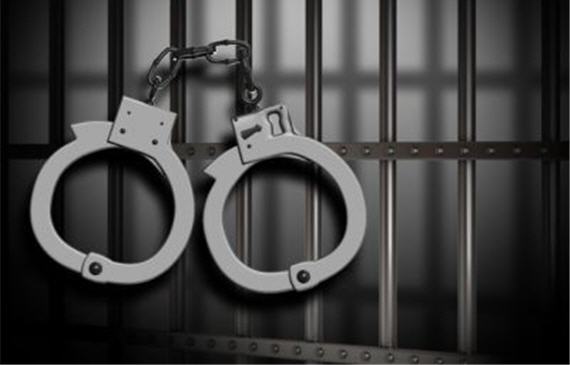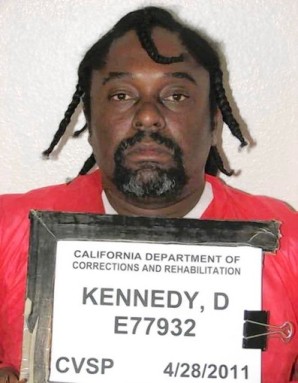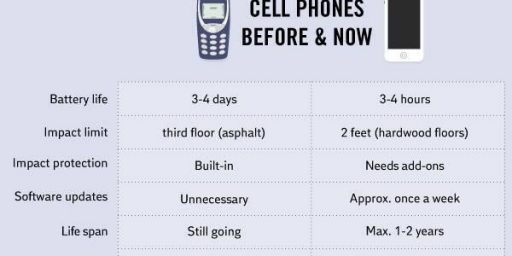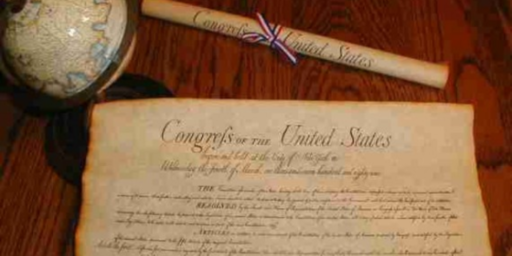Man Loses Parole For Calling Family to Tell Them of Parole
Dwayne Kennedy will spend 5 more years in prison for using a cell phone to call his family to tell them he'd been paroled.
Dwayne Kennedy managed to get paroled despite a life of violent crimes, only to lose said parole for using a cell phone to call his family to tell them he’d been paroled.
LA Times (“Borrowed cellphone slams prison cell shut“)
Dwayne Kennedy threw a man from a moving car in 1988, but that’s not what’s keeping him in prison today. It’s not the inmate he stabbed 17 years ago either; the state parole board forgave him that.
Instead, California prison officials are keeping Kennedy locked up for an extra five years — costing taxpayers roughly $250,000 — because guards caught him with a contraband cellphone he says he borrowed to tell his family he had just been granted parole and was coming home.
It was “just stupid on my part for even using it,” Kennedy told a pair of parole commissioners convened in June 2010 to decide his punishment for breaking prison rules. But “cellphones are just everywhere in prison nowadays…. It’s easy to borrow one from a guy,” Kennedy said.
Glenn Greenwald tweeted, “Just as he’s about to be paroled, inmate gets 5 more yrs for using a cellphone to call his family” and appended the hashtag #AmericanJustice. Now, technically, he didn’t get five more years for using the cell phone. Rather, his parole was revoked and he’ll have to serve an additional five years of his original sentence before getting another chance to request parole. But Greenwald’s right that the effect is the same.
This is a rather silly result here. Presuming that Kennedy deserved parole in the first place–and I have no reason not to defer to the parole board’s judgment on that question–another five years in prison and half a million in expense to the taxpayers seems a ridiculous consequence of a seemingly minor infraction.
The rationale behind the rule, however, is perfectly reasonable:
Phones are so prevalent in California prisons that even highly scrutinized inmates can get their hands on them. Charles Manson has been caught with two. Inmates have used cellphones to run drug rings, intimidate witnesses and order violent attacks on the outside. Despite state leaders’ rising anxiety over inmates obtaining phones, smuggling them into prisons wasn’t against the law until this month.
Gov. Jerry Brown signed a bill on Oct. 6 making it a misdemeanor punishable by up to six months in a county jail. Brown also issued an executive order that requires prison officials to increase the number of random searches of employees and to determine how much it would cost to send them through airport-style screening on their way into work.
Under the new law, most inmates caught with phones face losing 90 days of credit earned for good behavior.
In Kennedy’s case, using the cellphone derailed his parole bid and effectively lengthened his prison stay by at least five years. That’s because a 2008 ballot measure extended the time inmates serving life sentences must wait for a new hearing when they are denied parole or their parole offer is revoked.
When the two parole commissioners met to decide his punishment for violating the cellphone rule, Kennedy said that he had made the calls because he was “overwhelmed and just happy” that he had been granted parole.
“He was so happy…. We were crying and praying,” recalled his sister, Yolanda Kennedy, one of the people he called.
But months later, parole commissioners John Peck and Dennis Smith found that Kennedy’s willingness to violate the prison rule proved he is an “unreasonable risk of danger to society.” They revoked his parole offer and imposed the five-year wait until his next hearing.
This strikes me as sheer bureaucratic stupidity. Kennedy has no “right” to get paroled. He’s rather clearly a thug with a history of violence and instability. But it stretches credulity to argue that doing something that itself demonstrates humanity–reaching out to loved ones to share good news–demonstrates a risk of danger to society because there was a rule against it. After all, most of us break societal rules every day going to and from work.







“But Greenwald’s right that the effect is the same.”
No, he’s not right and when people like The Last Honest Man willfuly mischaracterize these sort of situtations they actually do far more harm than good. If we’re going to trust the parole board that this guy deserved early release, don’t we also have to trust the parole commissioners who decided that this violation should have cost him that opportunity? Yes, it seems like a stupid thing to me but if we don’t want right wingers throwing a fit about this “thug with a history of violence and instability” getting parole in the first place, it can’t be okay for liberals and libertarians to throw a fit when he loses that parole for breaking prison rules.
Mike
There has to be more to this story.
Otherwise, this is just incompetant government bureaucratic lunacy……….
Wait…..
@MBunge: The effect is that he’s going to spend five more years in prison for using a cell phone. To the extent that he’s a thug–and that’s his history–he was a thug when he got paroled. Calling his family doesn’t add one iota to his thuggishness.
I don’t know who’s throwing a fit here. Greenwald and I–people who come from rather different ideological viewpoints and often disagree on these sort of things–are merely pointing out that the end result here doesn’t make sense.
Absent contrary, evidence, I’m willing to defer to the parole board’s judgment that this guy didn’t pose a huge risk to society. But I’ve got contrary evidence that using a phone isn’t an indicator of violent tendencies.
When it comes to human scum like this Kennedy dude the means always are justified by the ends. Based on his history he should not have been paroled in the first instance. This decision merely reverses the earlier, stupefied decision to grant parole. (Incidentally, parole is a bad idea in every case of a career criminal, but that’s a topic for another time and day.)
On a different but related topic it’s worth noting the complete reinvention of Jerry Brown. The man was the loopiest of liberal flakes only a generation ago. Now, however, he’s morphed into a cross section of Rudy Giulani on crime and punishment, Bill Clinton on coopting Republican fiscal policies and Harry Truman on union busting. It’s astonishing. A lot of Democrats out there could learn several lessons from Moonbeam. First and foremost it’s never too late to get mugged by reality.
@James Joyner: “The effect is that he’s going to spend five more years in prison for using a cell phone.”
He’s spending 5 more years in prison because of a lifetime of violent crimes. To say it’s because he used a cell phone eliminates the whole “lifetime of violent crimes” from consideration. It’s exactly the same as when Greenwald described the killing of al-Awlaki as though he were just a law abiding U.S. citizen who was mowing his lawn one day when Barack Obama rolled up in the Presidential limo and popped a cap in his ass. Again, why do we trust the parole board that he deserved early release but we can’t trust parole commissioners that this violation justified losing that opportunity? Why do you feel comfortable substituting your judgment in one case but not the other? And how exactly is the prison system supposed to stop the rampant use of cell phones by inmates if they’re not going to punish those caught using them?
Mike
Who’s driven while tipsy? What about stealing office supplies, such as a piece of blank paper? Have you ever experimented with illegal drugs? Did you ever cheat on a test in college? Have you been late in paying a bill?
If the answer is yes, then you’ve broken a Rule, which proves you are an unreasonable risk of danger to society. Please proceed to your nearest detention center and submit to the authorities.
@Lit3Bolt: “If the answer is yes, then you’ve broken a Rule”
And breaking a Rule when you’re a convicted, violent felon is and has always been treated as different than when non-convicted, non-violent people do.
Mike
@Tsar Nicholas: You know who else went to prison for being a thug?
Malcolm X. Man, that guy didn’t do ANYTHING right.
@MBunge:
I disagree. The parole board considered his “lifetime of violent crimes” (2 incidents?) when they chose to grant him parole. The single new element in the revocation was the use of the cell phone.
The commissioners state it themselves:
Sounds like the Parole Board had been split on letting this guy go in the first place and the phone call was the proverbial straw causing one or more people to flip….
Similar to making sure you don’t insult a judge in the courtroom.
@Rick Almeida: It sounds like the man was sentenced for violent crimes that would take another five years to serve. Through the parole process, he was able to argue for a reprieve from completing his entire sentence, and then he screwed up the reprieve, and the original sentence was restored.
I assume he will up for parole again next year.
Actually, not so much. It’ll be five years before he can apply again per the new rules.
I would think the most equitable decision would have been to leave in him jail for another 90 days.
@James Joyner:Oops, I missed that part, as well as the life sentence part.
I can’t get over the people who celebrate the Kafka-esque “justice” of this story. Apparently he violated the terms of his parole before he was granted his parole.
Also, I’m sure the lack of sympathy has nothing to do with the fact that he happens to be a big black guy in dreadlocks. Nope, just pure objective rule-following here, yessiree.
@Lit3Bolt: “I can’t get over the people who celebrate the Kafka-esque “justice” of this story.”
I can’t get over the people who think a man convicted of violent felonies having to serve the prison time to which he was originally sentenced is some sort of “injustice”.
Mike
@Rick Almeida: “The single new element in the revocation was the use of the cell phone.”
And the existing truth is that he’s in prison because he was convicted of violent felonies. Again, why do people feel comfortable substituting their judgment for the parole commissioners who revoked his early release but simply accept the judgment of the parole board that granted it in the first place?
Mike
@MBunge: Because both decisions cannot be correct. Both could be wrong, or one or the other can be wrong. However he cannot be considered safe to enter society up until the moment he used a contraband phone, at which point he becomes a menace.
@MBunge:
I don’t. I disagreed with your characterization of their decision.
Yes, he’s committed violent crimes. He’s served time for them and he qualified for parole. Then he broke a prison rule, one that is well-justified given the dangerous prospects of prisoners being able to communicate with people on the outside without being monitored. He should be punished for it, but I’m not sure revoking his parole was the right way to do it.
Seems to be hard to defend, as 5 years in prison shouldn’t be given for minor offenses. So he’s be in prison for 21 years, and we’re surprised he’s excited to get out and wanted to call his family? This seems like an overreaction no matter what kind of other problems they are having with cell phones in prison.
I have a little bit of “imprisoning people for minor offenses is bad” bias. The 90 days seems entirely reasonable, but 5 years is little much.
Keeping black men down is one of the major missions of our criminal justice system. In this case, the system worked.
On a related note: does anyone know why they instituted a near-impossible to police ban that also leads to weird cases like this instead of just jamming the prison?
Most high-security facilities aren’t exactly downtown where this would be a problem, isn’t it?
Ebenezer, the *guards* have to be able to use their cell phones. What do you want them to do, work all day?